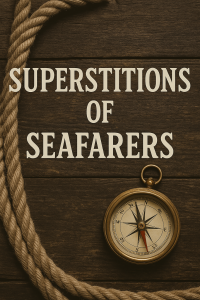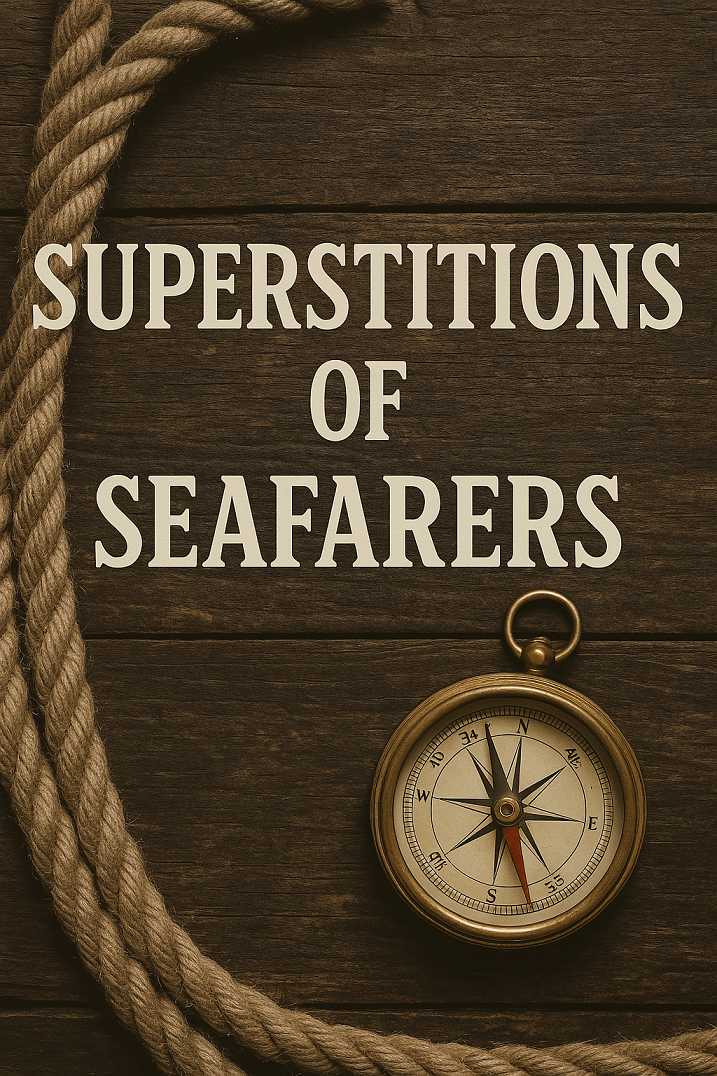Seafarers have long been guided by a unique set of beliefs and superstitions, passed down through generations. These maritime myths reflect sailors’ desires for safety and good fortune while navigating the unpredictable seas. From avoiding certain days to believing in the protective power of tattoos, maritime folklore is rich with traditions that shape the culture of seafaring. This article uncovers some of the most common superstitions held by sailors and explores their cultural significance in maritime history.

The Origins of Maritime Superstitions
Maritime superstitions often stem from ancient beliefs, cultural practices, and the unpredictable nature of the sea. Historically, sailors faced numerous dangers, including storms, shipwrecks, and navigational challenges. In response to these uncertainties, they developed rituals and beliefs intended to ward off misfortune and attract favorable conditions.Many of these superstitions are rooted in practical experiences or observations. For instance, certain animals were believed to bring good or bad luck based on their behavior or historical associations with ships. As a result, these beliefs became part of the seafaring culture and continue to influence modern sailors.
Common Superstitions Among Seafarers
- Bananas on Board
One of the most well-known maritime superstitions is that bananas are bad luck on a ship. This belief dates back to the 1700s when ships carrying bananas often encountered disasters. Several theories explain this superstition:
- Ripening Issues: Bananas ripen quickly and can spoil other fruits stored nearby. This could lead to food shortages during long voyages.
- Dangerous Cargo: Ships transporting bananas were often required to sail at high speeds to deliver the fruit before it spoiled, which increased the risk of accidents.
- Tropical Spiders: Bananas sometimes harbored dangerous spiders that could pose a threat to crew members.
Due to these associations, many sailors refuse to allow bananas on board, believing they will bring misfortune.
- Cats Bring Good Luck
Conversely, cats are considered lucky aboard ships. Historically, cats served a practical purpose by controlling rodent populations that could damage supplies and equipment. Sailors believed that caring for a ship’s cat would bring good fortune. However, if a cat fell overboard, it was thought that this could summon a storm.The reverence for cats is reflected in various maritime cultures; for example, in some traditions, a cat’s presence was believed to calm the seas due to their sensitivity to atmospheric changes.
- Whistling on Deck
Whistling is generally frowned upon on ships because it is believed to summon strong winds or storms. This superstition likely stems from ancient beliefs about whistling attracting Aeolus, the Greek god of winds. In some cultures, whistling was thought to disrupt the natural order at sea.However, there is an exception: ship cooks were often allowed to whistle while preparing meals as long as they did not consume their shipmates’ rations.
- Renaming a Boat
Renaming a boat is considered extremely bad luck among sailors. This superstition originates from ancient Greek mythology, where it was believed that changing a vessel’s name would anger Poseidon, the god of the sea. According to legend, Poseidon kept a “Ledger of the Deep,” recording all ships’ names; altering this name could provoke his wrath.To safely rename a boat, some sailors perform rituals involving removing all traces of the old name and conducting a re-christening ceremony that honors Poseidon.
- Friday Departures
Many sailors believe it is unlucky to set sail on a Friday. This superstition has historical roots; Friday has been associated with various negative connotations throughout history, including its connection with Christ’s crucifixion in Christianity. In nautical lore, Friday is often referred to as “Dies Infaustus,” meaning “unlucky day.”Despite its prevalence in some cultures, this superstition is not universal; many sailors still embark on voyages on Fridays without concern.
- Green Clothing
Wearing green clothing or allowing passengers dressed in green onto a ship is considered bad luck by many seafarers. The color green is associated with mold and decay—elements that can compromise a ship’s integrity at sea.In contrast, some believe that wearing blue clothing brings good fortune because it resembles the color of the sea and sky.
- Albatrosses and Other Birds
Birds hold significant symbolism in maritime culture; specifically, albatrosses are revered as symbols of good luck due to their association with souls lost at sea. The famous poem “The Rime of the Ancient Mariner” by Samuel Taylor Coleridge highlights this belief—the killing of an albatross brings misfortune upon the sailor.Other birds also carry meanings; for example:
- Cormorants: Seen as good omens when spotted at sea.
- Swallows: Indicate proximity to land and safe passage.
- Tattoos as Protection
Many sailors believe tattoos offer protection against misfortune while at sea. Specific designs hold particular meanings:
- Swallows: Represent safe return home after long journeys.
- Anchors: Symbolize stability and grounding.
- Nautical Stars: Serve as guides for navigation and protection during voyages.
These tattoos not only serve as personal expressions but also connect sailors with their heritage and shared experiences.
- Red Sunrise
A red sunrise is viewed as an omen of bad weather ahead—a warning sign indicating rough seas or storms approaching later in the day. This belief aligns with traditional weather lore that associates specific colors in the sky with impending weather changes.Conversely, a red sunset is often interpreted as favorable weather conditions for sailing.
- Jonah’s Curse
The story of Jonah from biblical lore serves as cautionary folklore among sailors; it teaches that bringing someone aboard who has previously experienced misfortune at sea can lead to disaster for everyone onboard. This superstition emphasizes the importance of choosing crew members wisely and respecting past experiences.
- Candlemas Day
Sailors traditionally avoid setting sail on Candlemas Day (February 2nd), believing any voyage begun then will end in disaster. This superstition may relate to customs surrounding seasonal changes and preparations for springtime voyages after winter storms subside.
- Avoiding Certain Days
Certain days are deemed unlucky for embarking on journeys:
- Thursdays: Associated with Thor—the Norse god of storms—are often avoided.
- Sundays: While some consider Sundays auspicious for sailing due to religious connotations, others believe it invites misfortune due to its association with rest days when work should be avoided.
Cultural Significance
These superstitions reflect deeper cultural beliefs about nature’s unpredictability and humanity’s relationship with it. They serve as coping mechanisms for seafarers navigating uncertain waters while fostering camaraderie among crew members through shared rituals and traditions.Moreover, these beliefs highlight how maritime culture has evolved over centuries—shaped by historical events such as naval battles or trade routes—and continue influencing modern sailing practices today.
Conclusion
The rich tapestry of maritime superstitions offers insight into seafaring culture’s complexities while emphasizing humanity’s enduring desire for safety amidst uncertainty at sea. From avoiding bananas onboard vessels to honoring cats as bringers of good luck—these beliefs remind us that even in an age dominated by technology and science, folklore still holds sway over those who venture into unpredictable waters.As we explore our oceans today—whether through commercial shipping or recreational boating—we honor these traditions passed down through generations while navigating toward safer horizons together!

